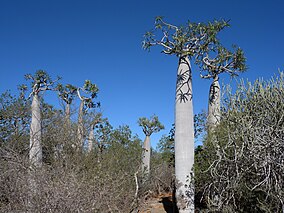Tsimanampetsotsa National Park
| Tsimanampetsotsa National Park | |
|---|---|
 Pachypodium lamerei in Tsimanampetsotsa | |
Map of Madagascar | |
| Location | South-west Madagascar |
| Nearest city | Toliara |
| Area | 456 km2 (176 sq mi) |
| Established | 1927 |
Tsimanampetsotsa National Park also spelt Tsimanampetsotse, and known as Tsimanampetsotsa Nature Reserve is a national Park in the region Atsimo-Andrefana in Madagascar. It lies on the southwest coast, south of Toliara. It contains Lake Tsimanampetsotsa, an important wetland and a Ramsar site. The Ramsar site has a total area of 456 km2 (176 sq mi) while the surface of the lake is much smaller.
| Viewing time | Species |
|---|---|
| Daytime |
|
| Nighttime |
|
Key Sites
There are several circuits of different duration and interests:[3]
- Tsiamaso circuit: Includes the cave and famous blind fishe.
- Andaka circuit: A short visit and walk beside the lake to see the birdlife.
- Emande circuit: Visit old tombs and some wonderful landscapes.
- Andalamaike circuit: A botanical walk through arid landscapes and spiney forest.
Tsimanampetsotsa Lake

The park takes its name from the saline Tsimanampetsotsa Lake. Due to its high salinity, there are no fish in the lake. More than 100 species of bird are found within the park, including various waders, ducks and flamingos. The lake sustains populations of Greater flamingo (Phoenicopterus roseus) and Lesser (dwarf) flamingo (Phoenicopterus minor).[3]
Viewpoint
The viewpoint is accesses from a car-park about half way along the east side of the lake. It is a short, but steep walk of about 200 meters, where some scrambling over rocks may be required. It provides splendid views across the lake.
Mitoho Grotto


Mitoho Grotto lies within the Tsimanampetsotse National Park. It lies at the end of the nature train from one of the two camp-sites. This is a sacred site where according to local belief the Antambahoka, an invisible people, live.
Present in these limestone cave systems live the blind fish (Typhleotris madagascariensis). Also present at this cave are a colony of swallows (Phedina borbonica).
The superstitious local people make sacrifices of black goats or black cockerels, and protect the cave and the blind Typhleotris madagascariensi fish by forbidding their removal.
External links
References
- ^ "Tsimanampetsotsa National Park". protectedplanet.net.
- ^ Mittermeier, R.A.; Louis, E.E.; Richardson, M.; Schwitzer, C.; et al. (2010). Lemurs of Madagascar. Illustrated by S.D. Nash (3rd ed.). Conservation International. p. 665. ISBN 978-1-934151-23-5. OCLC 670545286.
- ^ a b "Tsimanampetsotsa National Park". www.travelmadagascar.org. Travel Madagascar. Retrieved 10 September 2014.


